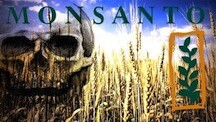
Monsanto, one of the most powerful and, probably, most despised companies in the world, has spent decades deceiving consumers, farmers, politicians, and regulators about the safety of its glyphosate-based herbicide Roundup. Employing strong arm tactics, straight from the tobacco industry playbook, the agrochemical/biotech giant has suppressed and manipulated scientific studies, harassed journalists and scientists who questioned the company line, colluded with regulators and intimidated citizens who dared to claim they had suffered harm.
Since 2015, however, when the World Health Organization (WHO) declared glyphosate a probable human carcinogen, along with a multitude of new scientific studies linking glyphosate to a panoply of health risks, such as cancer, Alzheimers, miscarriages, and disruption of human sex hormones, a storm has been brewing. And now, the multinational bully may be on the verge of losing its mojo.
In September, in San Francisco Superior Court, an historic ruling was delivered. For the first time, a jury found Monsanto corporation (recently merged with Bayer) fully liable for health damages caused by its top-selling herbicide, Roundup. The plaintiff, DeWayne Johnson, age 46, was awarded $289 million in compensatory and punitive damages. He is a former pest control manager for a California county school system, where he applied Roundup and Monsantos Ranger Pro on school grounds across the county up to 30 times per year for more than two and a half years. His case was expedited because he is suffering from non-Hodgkins lymphoma and has only a few months to live. Johnson is just the first of thousands of potential plaintiffs awaiting trial since the 2015 WHO designation of glyphosate.
The outcome of Mr. Johnsons case is a landmark moment – finally a mega-corporation that profits wildly from its toxic pesticide production will have to answer for its deceptive behavior. The verdict is also a scathing indictment of worldwide regulatory agencies, particularly in the U.S. The Environmental Protection Agency (EPA), U.S. Department of Agriculture (USDA) and Food & Drug Administration (FDA) which failed to protect the public health and land.
The next trial is due to take place in Monsantos very backyard, St. Louis, Missouri. So far, there are approximately 4,000 cases on track to sue Monsanto, with the possibility of tens of thousands more, in light of the San Francisco victory. Bayer, the new owner of Monsanto, is appealing the ruling, continuing to claim that the Roundup weedkiller is “safe,” but momentum is not in their favor. And shareholders are on a different page. Bayer stocks went into a freefall after the guilty verdict with upwards of 10 billion in claims expected down the line. Industry analysts have surmised that Bayer, which just took ownership of Monsanto in June 2018, is probably experiencing a heavy dose of Bayers remorse.
Hopefully, this will be a warning to all pesticide companies which have claimed that their products only kill weeds not people. Perhaps this will usher in a new urgency to use more nontoxic sustainable techniques to produce our food. Perhaps…Stay tuned.
(Update: in late October 2018, Monsantos appeal, claiming insufficient evidence, was rejected by the California Superior Court judge. However, she ruled to reduce the damages from $289 million to $78 million. Mr. Johnson and his legal team said that the reduction in punitive damages was unwarranted, but, rather than reject the amount and risk another trial, they chose to accept the revised award. This revision is not expected to deter the deluge of future lawsuits and Bayer’s stock remains around a 52-week low.)
Glyphosate, the active ingredient in Roundup, is a poison estimated to be much worse than DDT. The chemical has become ubiquitous in the environment and on food, particularly genetically engineered (GE) crops, which are far more contaminated than conventional or organic crops, though the poison has been known to spread to other farmlands. GE crops have been engineered to withstand high levels of Roundup without being killed. However, glyphosate cannot be washed off because it is absorbed by every cell of the plant. Thus, GE foods, which are now pervasive worldwide, but generally not labeled as such, are the most dangerous.
Resources
Monsanto Guilty Verdict Is Only Beginning – NEO Journal
Monsantos Loss Is Our Gain Lets Make the Most of It – Organic Consumers Association
Glyphosate May Be Worse Than DDT, Which Has Now Been Linked to Alzheimers Disease, Decades After Exposure – Dr. Mercola Bayer’s Monsanto: 8,700 Lawsuit Over Glyphosate – MarketWatch




